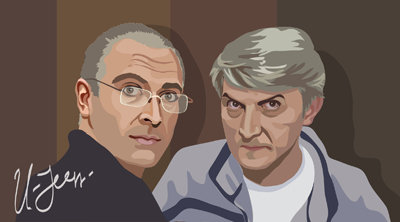MOSCOW, November 26 - RAPSI. In response to a question put to Prime Minister Dmitry Medvedev by French journalists on the possibility of pardoning Russian oil tycoon Mikhail Khodorkovsky and his business partner Platon Lebedev, he said once again that it is not the authorities but the prisoners who should make the next step by filing for a pardon.
The Russian prime minister gave an interview to L'Agence France-Presse (AFP) and the Figaro newspaper just before his visit to France.
Earlier, Medvedev, who was then the president of Russia, said that the president cannot pardon any convict, including YUKOS head Khodorkovsky, without a petition for pardon. Khodorkovsky's attorney said that his client, sentenced to 13 years in prison for oil theft and money laundering, would not be filing for the president's pardon.
"If they (Khodorkovsky and Lebedev) had filed for their pardon with the president, then the president could decide whether to grant them it or not. I was never sent this request," he said.
"So the ball is in their court?" a French journalist asked.
"Of course. As with any other convicted individual, if he or she has been found guilty, the individual can file a petition for pardon," Medvedev said.
The YUKOS case has been one of the most high profile in Russia over recent years. In the early 2000s, the authorities accused YUKOS executives Mikhail Khodorkovsky and Platon Lebedev of tax evasion. YUKOS, then the country's largest oil company, went bankrupt and its assets were taken over by Rosneft. Many in the West believe the case was politically driven. Moscow denies these charges.
In 2005, Khodorkovsky and Lebedev were sentenced to eight years in prison for fraud and tax evasion.
In late 2010, a Moscow district court sentenced them to 14 years in prison for oil theft and money laundering. They were expected to be released in 2017, considering the time they had already served for their previous convictions from their first trial. However, the Moscow City Court reduced their sentences by one year in May 2011.



